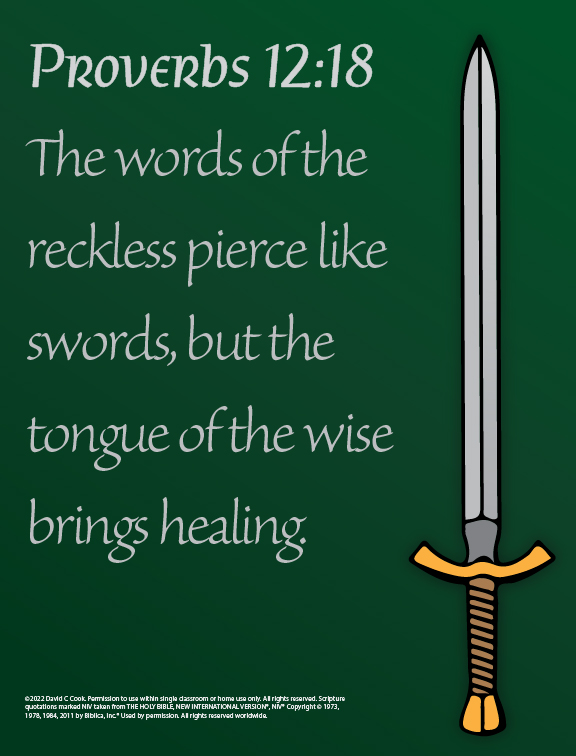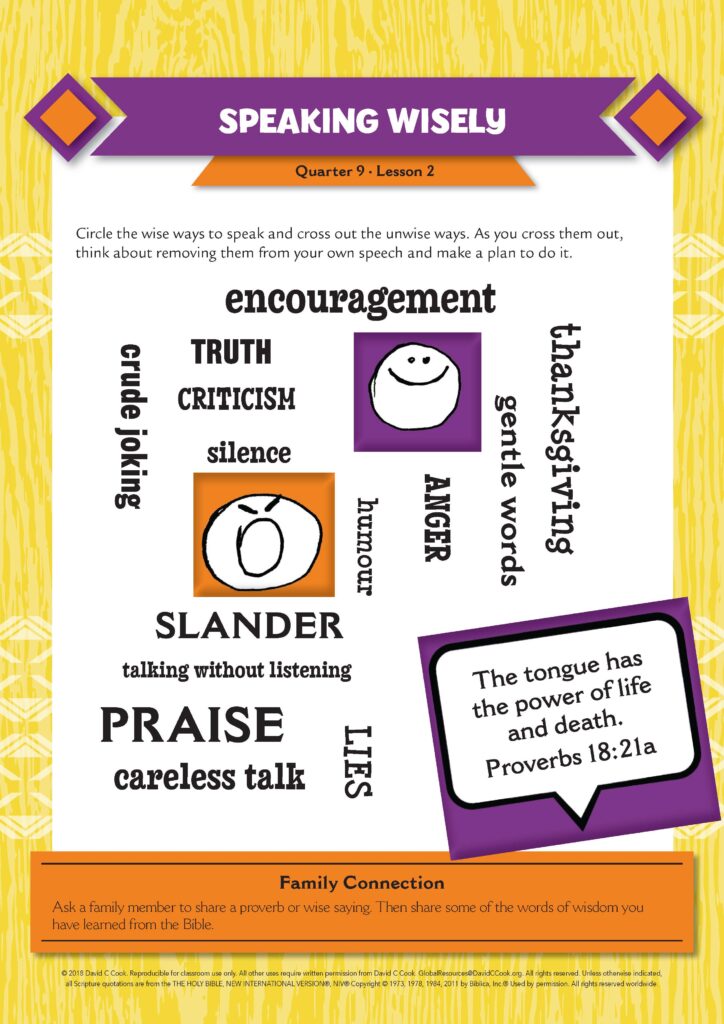During the lesson, the information for you to know is written in regular type, and what we suggest speaking or reading aloud to children is in bold. All resources for this lesson, including the Teacher Guide, Student Page, Family Connection Card, and other resources can be downloaded in a ZIP file by clicking on the following link:
In some lessons you will find "resource articles." These are articles written by experts from around the world to help equip you for your work with children and adolescents. Share them with parents or guardians if you consider it appropriate.
Before class, cur or tear apart the proverbs on the tear-out page at the end of this lesson.
Likewise, the tongue is a small part of the body, but it makes great boasts.
Consider what a great forest is set on fire by a small spark.
James 3:5
Words have the power to hurt or to heal. You have likely experienced the blessing of encouraging words and the devastation caused by harsh, dishonest, or hurtful speech. Our words can either bring life and refreshment to others or burn through our opportunities and relationships, as the fire burns through the forest. It all depends on the words we choose.
We can learn much from the book of Proverbs about carefully considering our words. Read the verses in this lesson. Then think about how your speech affects others. Do you need to speak less and listen more? Do you need to think before you speak? Ask God to allow your words to reflect His wisdom so that every word you speak may be life-giving to those around you.
Encourage the students to ask family members to share proverbs or wise sayings. The students can then share some of the words of wisdom they have learned from the Bible.
Teacher Tip: If possible, email or text the Family Connection Card to the families of your students.
As you greet students, invite them to share if they used wisdom recently and how it helped them. If you have time, allow 2–3 teens to share their experiences with the whole group.
Last week we talked about the treasure of wisdom.
Does anyone remember the book of the Bible that talks about wisdom?
Proverbs
Even people who have never read the Bible or who do not know God value wisdom. Every community has its own proverbs—or wise sayings. Today we will us think about some of these wise sayings.
Divide students into 8 groups. Give each group 1 of the proverbs from the tear-out page. Give the groups 3–4 minutes to figure out what the proverbs mean. Give each group a pencil to write their answers on the page. The winning group is the one with the most correct answers.
The proverbs and their meanings are included below for your reference:
After the activity, gather the students for discussion.
As these proverbs show, everyone can benefit from wisdom and advice. Cultures and even families may have their own wise words passed down through generations.
What is a wise saying you have heard?
Allow 2–3 students to share any words of wisdom or advice they have heard.
The book of Proverbs in the Bible is full of wise sayings. These proverbs are different than the ones we just heard because they come from God.
The proverbs of the Bible teach us about 2 different types of people: the wise and the foolish. The wise live carefully and follow God and His ways. But the fools do not listen to the advice of others or God, so they make selfish and thoughtless choices. One of the ways the wise and foolish are different is in the words they use.
Have a student read Proverbs 10:14 aloud from the Bible. If that is not possible, the verse is printed here.
The wise store up knowledge, but the mouth of a fool invites ruin.
Proverbs 10:14
What does this verse say the mouth of a fool can do?
A fool brings ruin or destruction near.
What do wise people do instead of speaking foolishly?
A wise person learns and stores up knowledge.
Let’s read some proverbs about wise and foolish speech. At times, the proverbs do not use the words “wise” and “foolish,” so we will have to decide which group the verse is talking about.
Have different students read each of the following verses from Proverbs directly aloud from the Bible. If that is not possible, the verses are printed here.
If you are using the Memory Verse Poster, show it to the students.
The words of the reckless pierce like swords, but the tongue of the wise brings healing.
Proverbs 12:18

What can we learn about wise words from this verse?
Allow 2–3 students to share their thoughts.
Repeat the question after each verse and allow 2–3 teens to share their ideas.
Those who guard their lips preserve their lives, but those who speak rashly will come to ruin.
Proverbs 13:3
A truthful witness saves lives, but a false witness is deceitful.
Proverbs 14:25
A gentle answer turns away wrath, but a harsh word stirs up anger. The tongue of the wise adorns knowledge, but the mouth of the fool gushes folly.
Proverbs 15:1–2
Even fools are thought wise if they keep silent, and discerning if they hold their tongues.
Proverbs 17:28
After all the verses have been read and discussed, ask the following questions.
Did you notice any similar ideas about wise speech?
Those who restrain their tongues, tell the truth, and control their words are wise.
Did you notice any similar ideas about foolish speech?
Those who talk a lot, are careless with their words, and do not seek to understand are fools. Guide the teens to understand that foolish speech includes gossip, lies, swear or curse words, and boastful words.
People who are wise in their speech are often more confident and less likely to regret what they say. They also earn the respect of others. Here are some ways you can speak wisely.
Speak respectfully. When you show respect for others in your speech, they are more likely to listen to you.
Speak truthfully. Telling lies will not help you earn trust with others. But when you are truthful, others will trust you and listen to what you say.
Speak kindly. Think about how the words you say will affect the person you are saying them to. Even if you have to say something difficult, try to say it with kindness.
Speak carefully. Say what you mean and try not to allow your emotions to control your speech. If necessary, pause to control your emotions or think of the best words to use. You are less likely to regret your words if you have carefully thought about them before saying them.
Listen. Sometimes wise speech is not about speaking at all. Sometimes it is about listening to what others say and responding appropriately—or not responding at all. If possible, always listen before you speak.
Listen while I read 3 situations. You will decide if the person in each situation is using wise words or foolish ones.
Share each situation, and have the students share their thoughts with 2–3 other students. Then allow 2–3 groups to share their answers with the whole class.
As we can see from these situations, those who possess wisdom keep control of their tongues and are careful about the words they speak. Those who are foolish speak without thinking about the damage their words may cause to themselves and others. Listen to what the Bible says about the power of words.
The tongue has the power of life and death, and those who love it will eat its fruit.
Proverbs 18:21
The words we say are important. They can give life or they can cause death—maybe not physical death, but foolish words can kill relationships, opportunities, and even the good things God wants to do in our lives. When we choose to speak wisely, we bring life to ourselves and to those around us.
What are some types of wise speech we can choose to use?
Have the teens share their ideas with their small groups. Then allow 2–3 groups to share their ideas with the whole class.
What are some types of foolish speech we should avoid?
Have the teens share their ideas with their small groups. Then allow 2–3 groups to share their ideas with the whole class.
Optional: If you are using the Student Pages, the teens can work in their groups to complete the activity on their pages.

Think of 1 area of wise speech you would like to practice. You might choose to say fewer words and listen more. You might choose to give kind and gentle answers, even when you feel angry or hurt. You might ask God for greater understanding of things happening around you so that your words can bring life to others.
Ask God to show you what He wants to help you with. If you are not sure you are ready to talk with God about using words wisely, think of ways you can be wise in your speech and make a plan to do those things.
Give the teens 4–5 minutes to respond.
Close with this blessing over your students taken from Proverbs 10:14 and 18:21:
Blessing: May you store up knowledge and understanding, and may the Lord help you to speak wise words that bring life to those around you.
Lead the children in singing this quarter’s song, if possible.
Life on Life ©2020 David C Cook. Reproducible for home or classroom use only. All other uses require written permission from David C Cook [email protected]. All rights reserved.